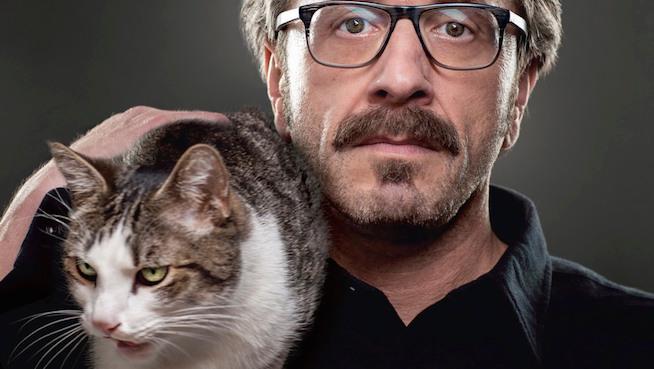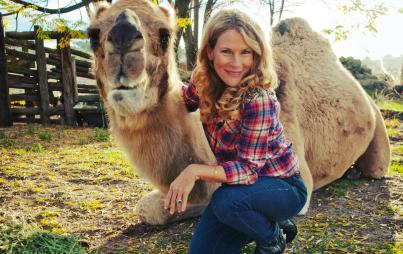
A not-so-unlikely source of conversation inspiration.
I’ve been listening to WTF for a few months now (I know, it’s like I just discovered this hip new vegetable called kale), and I truly believe that listening to the show regularly has made me a better conversationalist.
At this point, saying, “Hey, have you heard of this cool podcast called 'WTF with Marc Maron'?” is kind of like saying, “Hey, have you heard of this funky little coffee shop called Starbucks?” or “I just discovered this awesome show, Orange Is The New Black.” Marc Maron’s podcast has become an institution. He’s had Barack Obama as a guest, for God’s sake. The structure of Marc’s show is simple, and oft-emulated by other podcasts: He sits down with someone — usually an actor, comedian, or musician — and talks to them. The end result is a hybrid of a conversation and an interview. It’s often funny and sometimes profound and always, always engaging.
I’ve been listening to "WTF" for a few months now (I know, it’s like I just discovered this hip new vegetable called kale), and I truly believe that listening to the show regularly has made me a better conversationalist. I’ve learned to connect with people verbally in a deeper, more honest way. Here are a few tips and tricks I’ve soaked up from the master himself, Marc Maron:
1. If you want vulnerability and honesty from the other person, YOU have to be honest and vulnerable. This is probably the singular reason "WTF" has been so wildly successful: the interviews/conversations are beautifully real and raw and honest. Guests reveal secrets, fears, and sadness. They open up about tough topics, often prefacing with, “I’ve never talked about this publicly before.” Marc draws out that raw honesty because he’s willing to be raw and honest himself. He will offer up embarrassing stories of his own. He will admit faults and flaws and ugly moments from his past. And in doing that, he is not only leveling out the playing field, he is inviting his guests to be vulnerable WITH him. It’s such a gift to be vulnerable and real with someone else, and more often than not, it inspires them to be real too. Everyday conversations could use more of this.
2. When in doubt, ask about siblings. Those who regularly listen to Marc’s show will know that a common Marc-ism is, “Do you have siblings? What are they up to?” It seems like a basic question, but it’s actually a really good one for a few reasons. When people talk about their siblings, it often shines a light on interesting family dynamics and personality traits. Learning about someone’s siblings and their role in the group can provide insight into how the person grew up and became who they are. Plus, discussions about siblings usually include weird, funny childhood anecdotes and those are ALWAYS an excellent conversation starter.
3. Don’t try to be funny. You know what’s the quickest way to ruin a genuine give-and-take in a conversation? Trying really hard to be funny. As someone who is always eager to break an awkward silence with a dumb joke, it took me an embarrassingly long time to understand this. In fact, I think it was listening to Marc’s show regularly that drove this point home for me. Marc is a comedian, which makes his joke restraint that much more impressive. He lets conversations flow without trying to force funny moments, and guess what? Funny moments usually happen naturally. Genuine conversation often becomes weird and funny because people are weird and funny. Trust in that. Let it unfold. You don’t have to try that hard.
4. Be a conversational mirror. It’s so easy to be a passive listener and just mumble, “Uh-huh, right, uh-huh” when the other person is talking, but a great conversationalist knows they have to put in more work than grunting affirmations. Marc gets this, which is why he often uses a mirroring strategy during conversations, reflecting back what he heard to check for understanding and validate the other person. He’ll say things like, “So you’re saying you’re an agnostic?” or “That must have been a tough time in your life.” Don’t be shy about doing this in your own conversations. It might sound dorky, but people always appreciate the extra assurance that they’re being heard and understood.
5. Don’t be afraid to dig a little bit. Some of my favorite moments on the "WTF" podcast happen when the guest mentions something in passing, maybe a few words about being anxious, for example, and Marc will sense it’s a deeper, more complex topic than they’re letting on. “You mentioned being an anxious person,” he’ll say a few minutes later, “tell me more about that.” This is usually when the conversation gets really good. We have so many quick, superficial conversations these days. It’s so refreshing when people ask questions that inspire deeper reflection and discussion. Be tactful, of course, and respect cues that indicate the other person doesn’t want to talk about it, but in general, don’t be shy to dig a little bit below the surface. This is where real connection and understanding happen.








